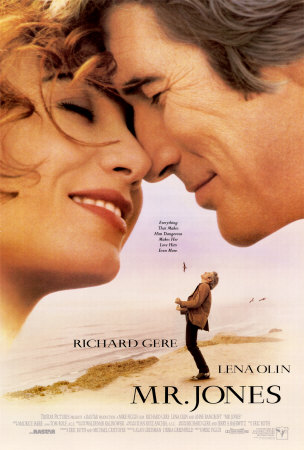
MR JONES
US, 1993, 114 minutes, Colour.
Richard Gere, Lena Olin, Bill Pullman, Anne Bancroft.
Directed by Mike Figgis.
Mr Jones is billed as a romantic drama. It is a star vehicle for Richard Gere (also executive producer) to portray a manic depressive, dramatising his euphoric highs and his paralysing lows. It is a sympathetic performance - with Gere giving more energy to his performance than usual. Lena Olin (Ultimate Lightness of Being, Havana, Enemies: A Love Story) is the psychiatrist who treats Mr Jones, falls in love, crosses ethical barriers. Anne Bancroft appears as the head of the hospital.
The film is set in San Diego and capitalises on the environment, especially the airport. Local medical facilities are used as locations for hospitalisation and treatment.
The film was directed by Mike Figgis, best known for his thrillers, Stormy Monday, Internal Affairs (with Richard Gere as a crooked policeman) and Liebestraum (with Bill Pullman, who makes an uncredited cameo appearance here).
The film has a particularly soft romantic ending - but is appropriate for the theme of the film being presented to the wide audience who would hope for some kind of uplift in the treatment of mental illness.
1.A romantic drama? Portrayal of personality and disorder, love and healing?
2.The San Diego settings, the city, the hospital? The musical score - especially the song of `Feeling Good'?
3.The title - no Christian name, the ordinary man, Everyman?
4.Richard Gere's performance as Mr Jones, sympathy, genial? The highs, the lows? Calm, anger? The riding of the bike, overtaking the riders, pleading for the job, having an uncanny knowledge about details of people's lives? At work, the hundred dollars for Howard? Working in rhythm, genial and making friends? The euphoric walk, the planes landing and taking off, his wanting to fly? Taken to hospital, the drugs, his being observed by doctors? The encounter with Elizabeth, his rapport with her? Listening to her, discussions, decisions? The court hearing for his custody? His interventions, explanations to the judge? The clash with Elizabeth? His talking with her, going to the bank, the withdrawal, the encounter with Susan, eating together, the hotel and its wealth, the piano shop and his playing, going to the Beethoven concert, disrupting the performance of the Song of Joy?
5.Mr Jones' ability to know people, the dramatic presentations of his highs and lows? Relating with people, going to therapy - and not being involved? His attitudes towards the sessions? His attitudes towards the drugs - not wanting to take them, throwing them away? Taking them when required, but reacting violently while watching the cartoons?
6.The film's portrayal of manic depression, the question of identifying one's personality disorder with one's personality? The therapists and their theories, techniques, listening? Mr Jones as willing and unwilling to have therapy? Understanding his condition, relying on his highs and not wanting to give them up? The sombre lows?
7.His getting a lift with Elizabeth? Her decision to go to the pier, walking in the sand with the water, the personalised talking, the growing rapport? Her hesitation, professional stances, intellectual stances? The emotions?
8.The portrait of Elizabeth, at home, waking up, the psychology book on the bed? Late to work? With Dr Holland, with Patrick, going on the rounds? With Mr Jones, getting his name? The humiliation of her lover leaving and bringing his girlfriend? Her susceptibility to emotions, Swedish, working in the United States, alone? The collage of her clients and the glimpses of their illness, her treatment, ability and inability to listen? The Chinese girl and her euphoric high, incessant talk? The videoing of the interviews? Going to court and wanting Mr Jones to be under protective care? The discussions with Dr Holland? With Patrick? The phone call in the night and the tragic death of the Chinese girl after the interview with Dr Holland and herself and her reassurances?
9.Mr Jones and his saving Elizabeth from the violent patient? His reaction to the information about Ellen Ryan? The truth about her being still alive, yet his considering her dead? His angers? Going for the walk in the woods? Pursued by Elizabeth, the rain? Her standing firm? His reliance on her? The sexual encounter (not visualised)? His greeting her the next morning?
10.The effect on Elizabeth, her discussions with Susan, going to the music school, the investigations about Ellen Ryan? Confronting Mr Jones? In the woods, the sexual encounter and the repercussions? Her discussions with Patrick and his severity with her? Her crisis, intellectual and emotional? The change in her? Giving her resignation to Dr Holland? Her keeping away? Her staying in her room when Mr Jones knocked at the door and pleaded for her? Getting the information from Howard, going to the building site?
11.On the building site, Mr Jones and his friendship with Howard? Giving the hundred dollars? Howard saving him? Coming to see him in the hospital? Having him at dinner with the family, Mr Jones helping the boy with his maths? Mr Jones looking at the 1968 bike, taking it, going to see Howard? The tension, suicidal? Howard trying to save him? Ringing the hospital? True friendship?
12.The building site, the overseer and his genial reaction, his negative reaction at the end?
13.The portrayal of the patients, in the interviews with Elizabeth? In the therapy sessions and expressing themselves? The drug treatments, common room? The visiting day? The violent patient?
14.A serious attempt at looking at a mental disorder, for the popular audience? The portrayal of the illness, the effect on people, the possibilities of treatment? Ethical questions and psychiatrists and their personal involvement with patients?